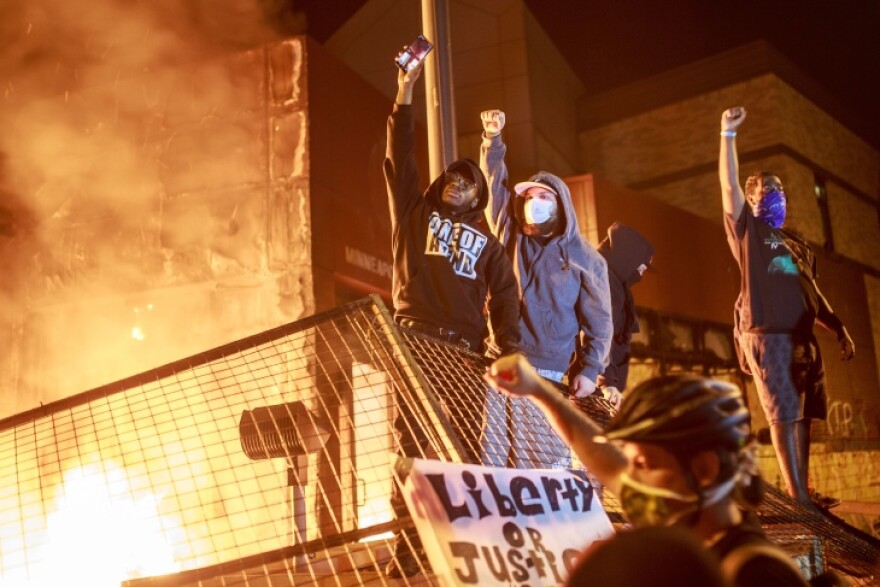With our free press under threat and federal funding for public media gone, your support matters more than ever. Help keep the LAist newsroom strong, become a monthly member or increase your support today.
George Floyd Protests: 'Why Do People Burn Down Their Own Neighborhood?'

Protests over the death of George Floyd in Minneapolis have swept the nation.
Floyd died Monday after an officer pinned him to the pavement by pressing his knee against his neck for nearly nine minutes, even as Floyd said he couldn't breathe and continuing after Floyd became unresponsive. The officer, Derek Chauvin, was arrested today and charged with third-degree murder and second-degree manslaughter.
Whenever violent unrest follows incidents of police violence against black Americans, it's almost inevitably trailed by some version of this question: "Why are protesters ruining their own neighborhood?"
But depending on who's doing the asking, the question is probably already loaded. USC law professor Jody Armour says we shouldn't necessarily expect "rational, reasoned behavior" when trying to understand a community experiencing trauma.
"It is one of the tragedies that comes out of this that, you know, people who are feeling so traumatized, they can't get to the other side of town. They can't go anywhere else. Sometimes they'll go to the Third Precinct police station like they did in this case, and set it ablaze."
"It's a message to the powers that be that says, 'You don't want your neighborhood, you don't want your community, burnt down, [so] stop killing our people.' And I think it's a tradition that goes back to the American Revolution ... They got fed up, and they tried and they petitioned and nothing happened, so they threw the tea in the bay, and they started, you know, burning stuff down. If there's no price to be put on a person's life, that's a powerless community's attempt to put a cost on that."
CHECK OUT THE FULL DISCUSSION:
Our news is free on LAist. To make sure you get our coverage: Sign up for our daily coronavirus newsletter. To support our nonprofit public service journalism: Donate now.
At LAist, we believe in journalism without censorship and the right of a free press to speak truth to those in power. Our hard-hitting watchdog reporting on local government, climate, and the ongoing housing and homelessness crisis is trustworthy, independent and freely accessible to everyone thanks to the support of readers like you.
But the game has changed: Congress voted to eliminate funding for public media across the country. Here at LAist that means a loss of $1.7 million in our budget every year. We want to assure you that despite growing threats to free press and free speech, LAist will remain a voice you know and trust. Speaking frankly, the amount of reader support we receive will help determine how strong of a newsroom we are going forward to cover the important news in our community.
We’re asking you to stand up for independent reporting that will not be silenced. With more individuals like you supporting this public service, we can continue to provide essential coverage for Southern Californians that you can’t find anywhere else. Become a monthly member today to help sustain this mission.
Thank you for your generous support and belief in the value of independent news.

-
What do stairs have to do with California’s housing crisis? More than you might think, says this Culver City councilmember.
-
Yes, it's controversial, but let me explain.
-
Doctors say administrator directives allow immigration agents to interfere in medical decisions and compromise medical care.
-
The Palisades Fire erupted on Jan. 7 and went on to kill 12 people and destroy more than 6,800 homes and buildings.
-
People moving to Los Angeles are regularly baffled by the region’s refrigerator-less apartments. They’ll soon be a thing of the past.
-
Experts say students shouldn't readily forgo federal aid. But a California-only program may be a good alternative in some cases.







